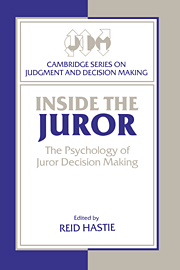Book contents
- Frontmatter
- Contents
- Series preface
- List of contributors
- Editor's preface
- Acknowledgments
- Part I Models of juror decision making
- 1 Introduction
- 2 Some steps between attitudes and verdicts
- 3 The influence of outcome information and attitudes on juror decision making in search and seizure cases
- 4 Algebraic models of juror decision processes
- 5 Stochastic models of juror decision making
- 6 Formal and empirical research on cascaded inference in jurisprudence
- 7 Argument structuring and evidence evaluation
- 8 The story model for juror decision making
- Part II Commentaries
- Index of names
- Index of subjects
3 - The influence of outcome information and attitudes on juror decision making in search and seizure cases
Published online by Cambridge University Press: 04 August 2010
- Frontmatter
- Contents
- Series preface
- List of contributors
- Editor's preface
- Acknowledgments
- Part I Models of juror decision making
- 1 Introduction
- 2 Some steps between attitudes and verdicts
- 3 The influence of outcome information and attitudes on juror decision making in search and seizure cases
- 4 Algebraic models of juror decision processes
- 5 Stochastic models of juror decision making
- 6 Formal and empirical research on cascaded inference in jurisprudence
- 7 Argument structuring and evidence evaluation
- 8 The story model for juror decision making
- Part II Commentaries
- Index of names
- Index of subjects
Summary
A juror's decision is the product of a complex set of factors including, at a minimum, the juror's personal history, character, and social background; attitudes, ideologies, and values; limits and proclivities of his or her cognitive processes; the nature of the evidence presented at trial; and legal rules that are supposed to govern the ways in which the evidence is interpreted, weighted, and applied to the decision. We start with the assumption that no single current scientific approach will be adequate, by itself, to provide an account of even the most common phenomena of juror decision behavior. However, building blocks for a useful hybrid theory are available in several cognate disciplines comprising elements from sociological and psychological theories of personality and social structure, political science concepts of ideologies and legitimating values, cognitive information processing theories of problem solving and judgment, and jurisprudential analyses of rules of evidence and institutions of trial procedure. The present program of research is an attempt to develop the type of eclectic theoretical framework that we think is necessary for an adequate scientific analysis of legal decision making. We use path analysis statistical models in the research because they provide a method of data analysis appropriate to capture the complex causality manifested in legal decision phenomena.
Our program of research focuses on the relationship between the attitudes that jurors bring into the jury box and the manner in which they respond to certain judicial instructions. The instructions on which we focus represent a common procedure at trial; instructions to the jurors to ignore evidence they have heard or seen, to strike information from memory and consideration when deciding the case.
- Type
- Chapter
- Information
- Inside the JurorThe Psychology of Juror Decision Making, pp. 65 - 83Publisher: Cambridge University PressPrint publication year: 1993
- 4
- Cited by



